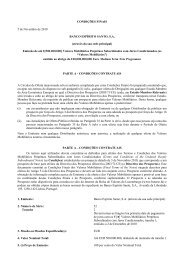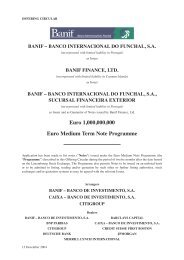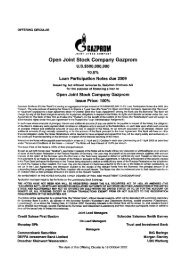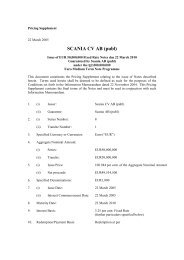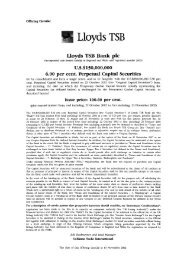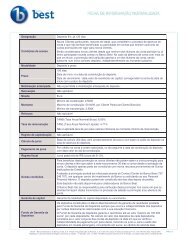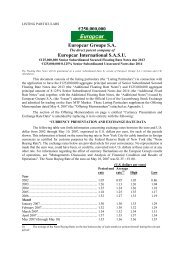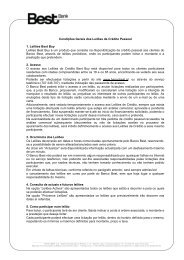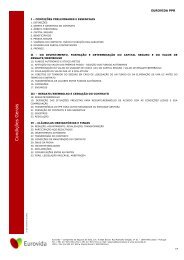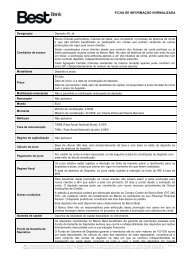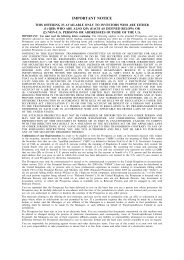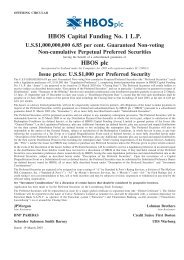US$75000000 Lupatech Finance Limited - Banco Best
US$75000000 Lupatech Finance Limited - Banco Best
US$75000000 Lupatech Finance Limited - Banco Best
You also want an ePaper? Increase the reach of your titles
YUMPU automatically turns print PDFs into web optimized ePapers that Google loves.
educing economic growth. As a result, interest rates have fluctuated significantly. For example, the official interest<br />
rates in Brazil at the end of 2005, 2006, 2007 and at March 31, 2008 were 17.75%, 18.0%, 13.25% and 11.25%,<br />
respectively, as set by the Brazilian Committee on Monetary Policy (Comitê de Política Monetária), or the COPOM.<br />
Future Brazilian government actions, such as interest rate decreases, intervention in the foreign exchange<br />
market and actions to adjust or fix the value of the real, may trigger increases in inflation. If Brazil experiences high<br />
inflation in the future, we may not be able to adjust the prices we charge our customers to offset the effects of<br />
inflation on our cost structure, which may have a material adverse effect on us.<br />
Exchange rate instability may adversely affect the Brazilian economy and the trading price of our bonds.<br />
As a result of several pressures, the Brazilian currency has been devalued periodically in relation to the<br />
U.S. dollar and other foreign currencies during the last four decades. Throughout this period, the Brazilian<br />
government has implemented various economic plans and utilized a number of exchange rate policies, including<br />
sudden devaluations, periodic mini-devaluations during which the frequency of adjustments has ranged from daily to<br />
monthly, floating exchange rate systems, exchange controls and dual exchange rate markets. From time to time,<br />
there have been significant fluctuations in the exchange rate between the Brazilian currency and the U.S. dollar and<br />
other currencies. For example, the real depreciated against the U.S. dollar 18.7% in 2001 and 52.3% in 2002.<br />
Although the real appreciated 11.6%, 8.7% and 17.2% against the U.S. dollar in 2005, 2006, and 2007 respectively,<br />
there can be no assurance that the real will not depreciate or be devalued against the U.S. dollar again. On<br />
March 31, 2008, the U.S. dollar-real exchange rate was R$1.749 per US$1.00.<br />
Depreciations of the real relative to the U.S. dollar could create additional inflationary pressures in Brazil<br />
and lead to increases in interest rates, which may negatively affect the Brazilian economy as a whole, as well as the<br />
trading price of our bonds.<br />
Developments and the conditions prevailing in other emerging market countries have in the past significantly<br />
affected the availability of credit and resulted in considerable decreases in investor demand and volume of<br />
foreign investments in Brazil.<br />
There can be no assurance that future developments in emerging market countries and government<br />
measures in these countries would not adversely affect the availability of credit in the local and international<br />
markets, thereby negatively affecting the Brazilian economy, our business and results of operations. If our access to<br />
the capital and finance markets is restricted, we could have difficulties in implementing our capital expenditure plan<br />
and maintaining our market share, which may adversely affect our financial condition and results of operations and<br />
the market value of the bonds.<br />
Risks Relating to Argentina<br />
Political, economic and social instability in Argentina may adversely impact our business operations in<br />
Argentina.<br />
During 2001 and 2002, Argentina went through a period of severe political, social and economic crisis.<br />
Although general economic conditions have shown improvement and political protests and social disturbances have<br />
considerably diminished since the economic crisis of 2001 and 2002, the rapid and radical nature of the changes in<br />
the Argentine social, political, economic and legal environment over the past five years and the absence of a clear<br />
political consensus in favor of any particular set of economic or political policies have given rise to significant<br />
uncertainties about the country’s economic and political future. It is unclear whether the economic and political<br />
instability experienced over the past years will continue and it is possible that, despite recent economic growth,<br />
Argentina may experience another recession, higher inflation, unemployment and greater social unrest. As a result,<br />
these factors may result in a material adverse effect on our results of operations and financial condition.<br />
During its crisis in 2001 and 2002, Argentina experienced social and political turmoil, including civil<br />
unrest, riots, looting, nationwide protests, strikes and street demonstrations. Despite Argentina’s ongoing economic<br />
recovery and relative stabilization, the social and political tensions and high levels of poverty and unemployment<br />
continue. These conditions could adversely affect our relations with our employees, which could affect our<br />
operations. Future government policies to preempt or respond to social unrest may include expropriation,<br />
20



